Quote and images of the month 10.2021
Richard Law, UTC 2021-10-22 07:22
Albert Anker (1831-1910),
[A night in the slammer]
The Swiss painter Albert Anker (1831-1910), writing on 5 September 1905 to Julia Hürner, the daughter of his old friend Ludwig Hürner (1827-1903), retailed a brief anecdote about his military incarceration that had taken place fifty years previously, during his student days in Bern.
To appreciate the gentle humour of the anecdote the reader must know that Albert and Ludwig both came from highly respectable families, were both theology students at the time and were both intended for the priesthood. Ludwig did become a vicar, Albert became a renowned artist.
Wir haben Militär im Dorf, Genietruppen, die aber nicht viel Wesens machen. Bei diesem Anlass dachte ich auch an meinen Militärdienst im Studentencorps. Ich habe Ihnen auch schon erzählt, wie ich einmal im Karzer war, und zwar mit Ihrem Vater; mir war eine Nacht diktiert, weil mein Gewehr nicht sauber war, ihm, weil er eine Übung geschwänzt hatte. Am Abend um 9 Uhr traten wir die Gefangenschaft an, nahmen Kerzen mit, eine Flasche Wein und ein nützliches Buch. Gegen 1 Uhr legten wir uns auf die Pritsche mit Decken, und um 6 Uhr wurden wir entlassen, gingen aber schnurstracks ins Bad…
We have the army in the village, sappers, but they don't cause much disturbance. This event prompted me to think of my military service in the Student Corps. I once told you that I was once in the cells together with your father; I was sentenced to one night because my rifle was not clean, he got the same because he had skipped an exercise. Nine o'clock in the evening we commenced our imprisonment, took candles with us, a bottle of wine and a useful book. Around one in the morning we stretched out on the bunks under blankets and at six o'clock we were released and we went straight off to the swimming pool…
Robert Meister (ed.), Albert Anker und seine Welt: Briefe, Dokumente, Bilder. Zytglogge Verlag Bern, 1981, p. 21.
Translation note: We assume that ins Bad means in the swimming pool and not just 'for a bath' – Anker was a passionate swimmer and even a swimming teacher.
Julia Hürner never married. Her extensive correspondence with Anker in his later years provided a rich source for his biography.
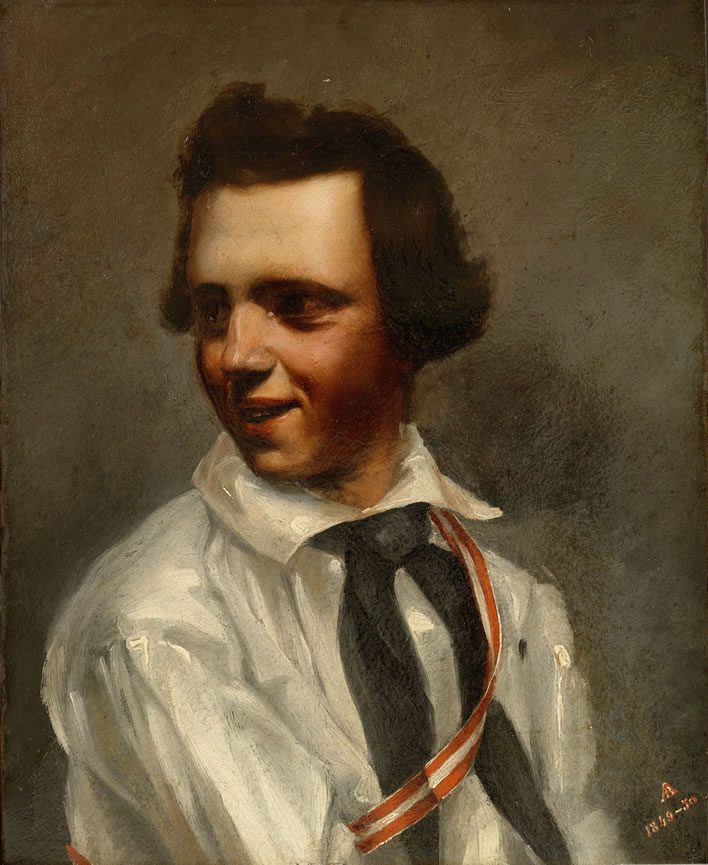
Albert Anker, Selbstbildnis als Zofingerstudent / Self-portrait as a student in Zofingen, 1849-1850. The picture is from around the time of the military service described in his anecdote. Image: Museum zu Allerheiligen Schaffhausen, Legat Schachenmann-Rubli. [Click to view a larger version in a new browser tab.]
Anker is probably the most popular and well-known painter in Switzerland. Most Swiss people could identify an Anker painting at a glance. The lady who recently came to measure up for my curtains took one look at the paintings hanging in my kitchen and got the Ankers and the Hodlers without prompting. [They are only cheap printed versions – I have lent out the originals to various museums.]
A frequent theme of Anker's paintings is that of older children looking after younger children. In the rural communities of the time, frequently with large families, both parents had work to do, so looking after small children was frequently a job for the older siblings.
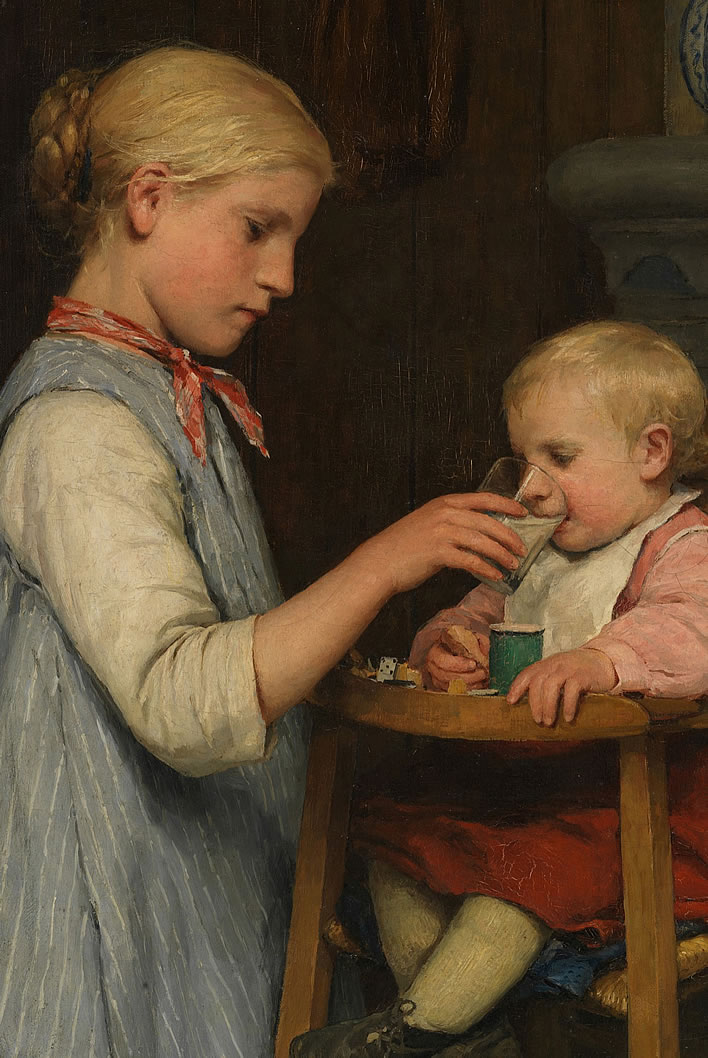
Albert Anker, Das kleine Mütterchen / The little mother, ca. 1888 Image: Museum zu Allerheiligen Schaffhausen. [Click to view a larger version in a new browser tab.]
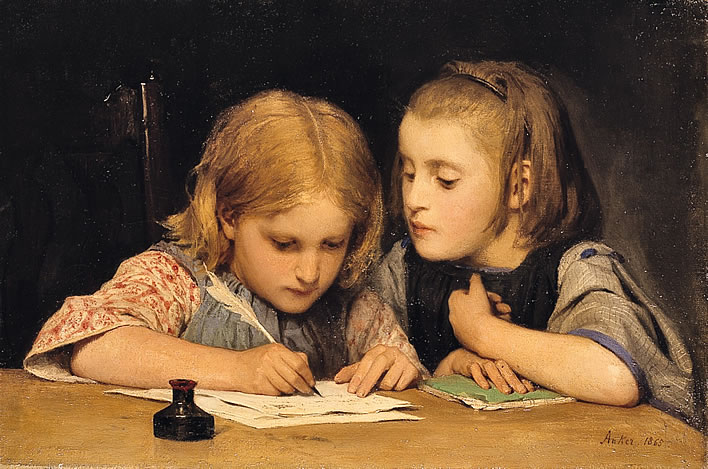
Albert Anker, Schreibunterricht II / Writing lesson II, 1865 Image: Privatbesitz. [Click to view a larger version in a new browser tab.]
Readers with exceptional memories may recall our encomium to the charitable public spirit of the Swiss in our article for Swiss National Day, 1 August, 2020. This took as its text Gottfried Keller's (1819-1890) poem Sommernacht (1847), in which the strong and sturdy in the rural community come to the aid of the weak and helpless. We find ourselves here in a net of ideas that we could easily term a Zeitgeist.
The miserable conditions of the common people and particularly the rural poor in the age that saw the beginnings of the industrial revolution in Europe, the collapse of the old feudal order and numerous political upheavals awoke the consciences of many observers, particularly those of devout Christians. German historians invented the term 'pauperism' for the economic distress of this age that was felt across Europe (including Britain).
Johann Heinrich Pestalozzi (1746-1827), theologian, lawyer, educator and philanthropist, was an early example of one such charitable spirit (Anker painted a fine portrait of him).
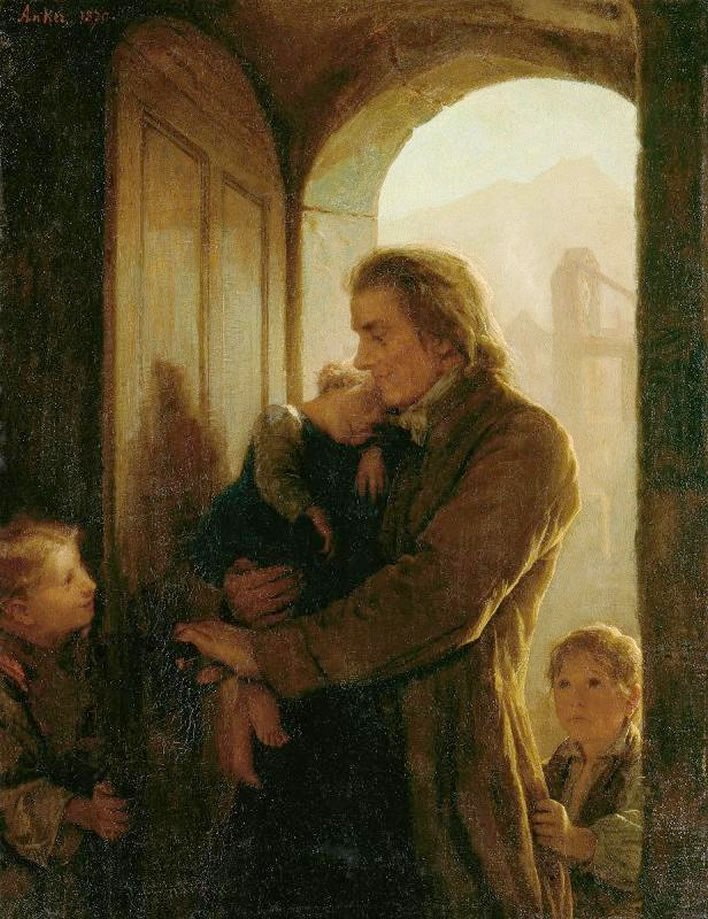
Albert Anker, Heinrich Pestalozzi und die Waisenkinder in Stans / Heinrich Pestalozzi with the Orphans of Stans, 1870. Image: Kunsthaus Zürich.
The gallery notes: The resistance of the inhabitants of Canton Nidwalden, who rejected the centralised Helvetian Republic and saw themselves as already free without the need to be 'liberated' by the occupying French army, was bloodily broken by overwhelming force in 1798. Heinrich Pestalozzi (1746-1827) was sent to Stans (in Canton Nidwalden) to look after the orphans left after the massacres among the civilian population. The image connects the portrait of the exemplary pedagogue Pestalozzi with the tradition of the representation of charitable actions and stresses, in the topical context of the Franco-Prusssian War of 1870, the humanitarian role of Switzerland.
Readers should note the careful composition of the picture (which is considered in detail here): we move from the welcoming, smiling girl, already rescued, past the sleeping child in Pestalozzi's arms, then to the anxious boy holding on to Pestalozzi's coat, fearing he has been abandoned. If ye have tears, shed them now!
Jeremias Gotthelf (1797-1854, real name Albert Bitzius), a pastor with a talent for putting misery, injustice and nobility into words, was deservedly widely read (and still is) – Anker illustrated an edition of Gotthelf's works with hundreds of drawings and watercolours; Gottfried Keller, one of the great writers in German, wrote of Gotthelf's works with general approval.
There were many more such figures that we could mention, but the point has been established: the nexus of Christian charitable effort and selfless works was a Zeitgeist of the age and Albert Anker was firmly in that tradition.
We well-fed moderns, cynical, worried about our waistlines and our pronouns, should not take Anker's paintings to be merely superficially attractive, saleable kitsch but faithful representations of the beneficial social realities of his time, the Christian values that would lead out of hardship towards 'solid joys and lasting pleasure'.
In Anker's work, whether in illustrations of older helping younger, or children making themselves useful, or children being looked after and educated, we find this spirit of community, of the 'social glue' which binds communities together. Whereas adults all had some moral baggage to drag along – Anker produced several works illustrating the ruin caused by drink, for example – children were innocents in need of nurture and protection who would become the adults of tomorrow.
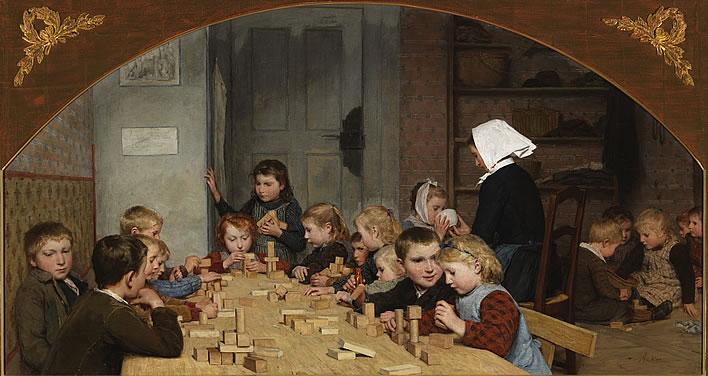
Albert Anker, Kinderkrippe II (beim Spielen) / Kindergarten II (play time), 1894 Image: Sammlung Christoph Blocher. [Click to view a larger version in a new browser tab.]
Anker's portraits of children, singly or in groups, are his most recognizable and widely known works. Despite their strong emphasis on family life and the everyday life of the rural population his paintings never become cloying images of caricature people. Anker took local children as his models and represented them with astonishingly skilful realism and attention to detail.
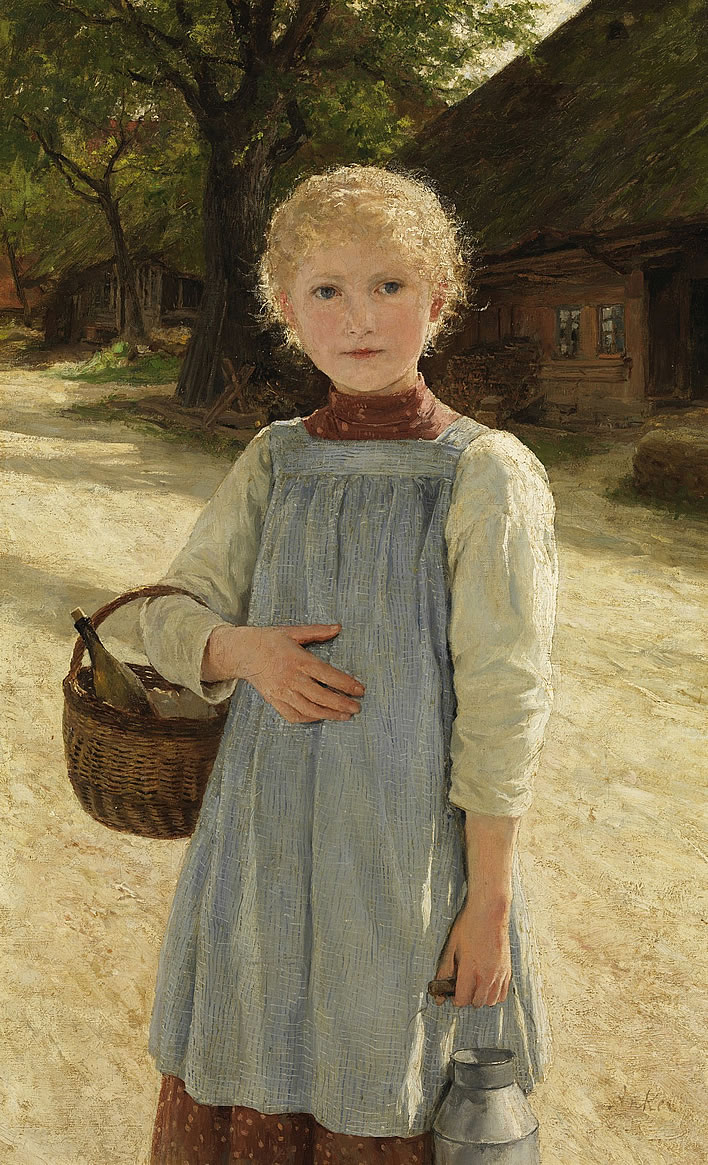
Albert Anker, Mädchen mit Milchkanne und Korb / Girl with milk can and basket, ca. 1894 Image: Privatbesitz, Depositum Museum zu Allerheiligen Schaffhausen. [Click to view a larger version in a new browser tab.]
Anker's own life was modest and grounded, despite his immense fame in the last half of it. For us diminished ones today his works are a mighty counterweight to our sneering age of moral and philosophical bedlam. You, too, should have a few in your kitchen.
0 Comments
Server date and time:
Browser date and time:
Input rules for comments: No HTML, no images. Comments can be nested to a depth of eight. Surround a long quotation with curly braces: {blockquote}. Well-formed URLs will be rendered as links automatically. Do not click on links unless you are confident that they are safe. You have been warned!